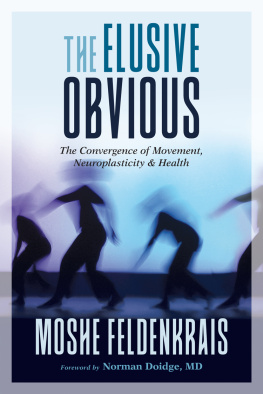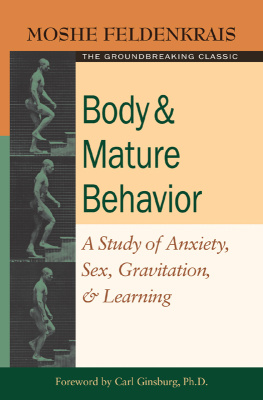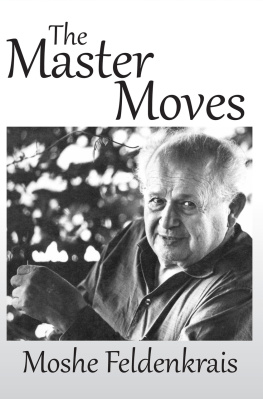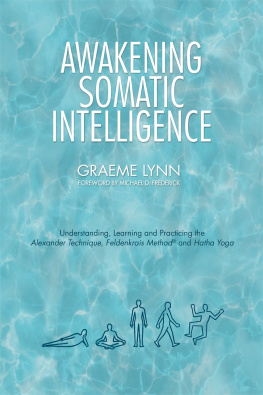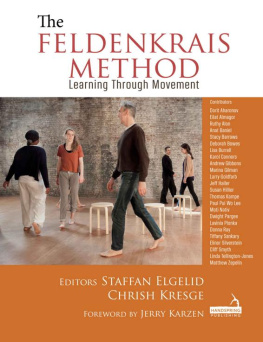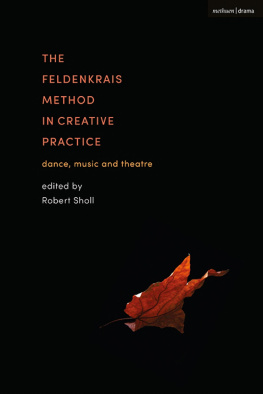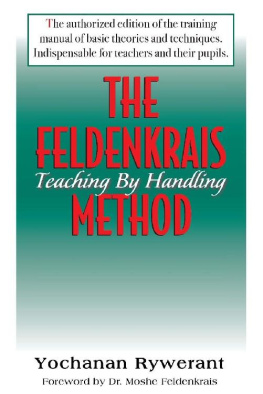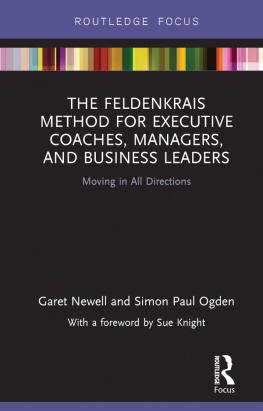
Praise for The Elusive Obvious
Moshe Feldenkrais was a unique visionary, and a great philosopher of consciousness and human evolution. The Elusive Obvious is an outstanding presentation of his powerful ways of viewing and improving life.
Russell Delman, founder of The Embodied Life School
Feldenkraiss work is innovative, gentle, and often strikingly effective.
Andrew Weil, MD Integrative Medicine pioneer and author
In The Elusive Obvious we encounter a compelling intelligence that is ahead of its time. It encourages us to promote a more holistic view of human knowledge, capacity, and potency, a view of knowledge that includes embodied attention and experience. Indeed, we learn that we can recover what eluded us.
Jennifer Kayle, professor of dance, University of Iowa
The Elusive Obvious is Moshe Feldenkraiss most accessible book and covers his most profound ideas and the fundamental principles behind his method. It is an absolute must-read for anyone interested in the processes of learning, healing, and self-improvement.
Marek Wyszynski, physical therapist, cofounder of The Feldenkrais Institute of New York
Dr Feldenkrais was a seminal twentieth-century thinker. In the Awareness Through Movement system he coached us to move better, hurt less, and have more choices. His teaching stresses a gentle and natural framework for self-healing. The Elusive Obvious presents the scientific logic for his unique method.
Deborah Goldberg, MD, pain specialist
Feldenkrais is not just pushing muscles around, but changing things in the brain itself.
Karl Pribram, MD, neuroscientist
Feldenkrais is one of the best ways to get in touch with your body and to open it up to new and better movements than you thought possible.
Hunter Pence, Major League Baseball player
The Elusive Obvious brilliantly forecasts neuroscience research frameworks like embodied cognition, dynamic systems theory, and enactivism, which all confirm Dr. Feldenkraiss insights gained from study, practice, and the sheer nerve to move against rivers of prevailing thought. Read this book for its breathtaking, concise, and compassionate wisdom; read to find courageous mantras for your personal practice; or read simply to walk alongside the endlessly hopeful, wise, and inquisitive mind of Dr. Moshe Feldenkrais.
Andrew Belser, professor of movement, voice, and acting, Pennsylvania State University
Feldenkrais has studied the body in movement with a precision that I have found nowhere else.
Peter Brook, OBE, theater and film director
Copyright 2019, 1981 by Somatic Resources and the Estate of Moshe Feldenkrais. Foreword 2019 by Norman Doidge.
Published by
North Atlantic Books
Berkeley, California
and
Somatic Resources
830 Bancroft Avenue
Berkeley, California 94710
First published by Meta Publications, Capitola, California, 1981.
Cover design by Jasmine Hromjak
Book design by Happenstance Type-O-Rama
Printed in the United States of America
The Elusive Obvious: The Convergence of Movement, Neuroplasticity, and Health is sponsored and published by the Society for the Study of Native Arts and Sciences (dba North Atlantic Books), an educational nonprofit based in Berkeley, California, that collaborates with partners to develop cross-cultural perspectives, nurture holistic views of art, science, the humanities, and healing, and seed personal and global transformation by publishing work on the relationship of body, spirit, and nature.
North Atlantic Books publications are available through most bookstores. For further information, visit our website at www.northatlanticbooks.com or call 800-733-3000.
Feldenkrais, Feldenkrais Method, Functional Integration, Awareness Through Movement, and Guild Certified Feldenkrais Practitioner are service marks of the Feldenkrais Guild of North America.
Library of Congress Cataloging-in-Publication Data
Names: Feldenkrais, Moshe, 19041984, author. | Doidge, Norman, writer of
foreword.
Title: The elusive obvious : the convergence of movement, neuroplasticity,
and health / Moshe Feldenkrais.
Description: Berkeley, California : North Atlantic Books, 2019. | First
published by Meta Publications, Capitola, California, 1981. | Includes
bibliographical references.
Identifiers: LCCN 2018046747| ISBN 9781623173340 (paperback) | ISBN
9781623173357 (e-book)
Subjects: LCSH: Exercise. | Movement, Psychology of. | Mind and body. | Motor
ability. | BISAC: HEALTH & FITNESS / Alternative Therapies. | BODY,
MIND & SPIRIT / Healing / General. | HEALTH & FITNESS / Healing.
Classification: LCC RA781 .F45 2019 | DDC 612.7/6dc23
LC record available at https://lccn.loc.gov/2018046747
I would like to thank the architect, Allison Downs. Without her sharp critical understanding this book and The Case of Nora would not be what they are. Besides that, she did all the typing. Only a lifelong friend could do that for me.
Also by Moshe Feldenkrais
- Embodied Wisdom: The Collected Papers of Moshe Feldenkrais
- Body and Mature Behavior:
- A Study of Anxiety, Sex, Gravitation, and Learning
- The Potent Self: A Study of Spontaneity and Compulsion
- Awareness Through Movement
- Body Awareness as Healing Therapy: The Case of Nora
- The Master Moves
- Practical Unarmed Combat
- Judo: The Art of Defense and Attack
- Higher Judo: Groundwork
Medical Disclaimer
The following information is intended for general information purposes only. Individuals should always see their health care provider before administering any suggestions made in this book. Any application of the material set forth in the following pages is at the readers discretion and is his or her sole responsibility.
Foreword
T here are books with titles that describe exactly what they are about in a self-evident way, like Darwins On the Origin of Species, and those with titles that opt to be evocative and reveal their meaning over the course of being read, like Oliver Sackss The Man Who Mistook His Wife for a Hat.The Elusive Obvious, by Dr. Moshe Feldenkrais, is, obviously, of the latter evocative category.
Trained in engineering, mathematics, and physics, there was a side of Moshe Feldenkrais that valued linear thinking and clarity of thought. But he had another side that wanted his listeners or readers to work things out for themselves. This was central to his practice. Feldenkraiss approach to helping people involved setting up situations where individuals could discover what they needed instead of him telling them what to do. As he says in this book, I myself do not like predigested food.
Fair enough; but people often do like to know what they are eating, digested or not. So allow me to say what I think this book is about, its importance, and a few words about why I, not a Feldenkrais practitioner, was asked to write this foreword.
The title, beautiful in its own way, points to a paradox of everyday life. It is a paradox that emerges from our habits and the unconscious way in which we normally perform everyday tasks and routines. As we repeat these activities, they become familiar, and soon everything about them seems obvious to us. The more we do these things, the more familiar and automatic (one might say less than fully conscious) they become, and soon, the less we notice or understand them. This raises a problem for us because most people think that the more we do something, the more we know about it.
Next page
